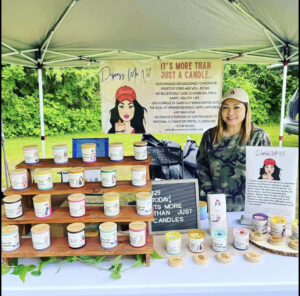 Farmers Markets bustle with energy, flavor, and goods, serving as a vital resource for many communities and entrepreneurs. They provide great opportunities for local businesses to market and sell their products: everything from fresh produce to handmade items. Farmers Markets offer more than just shopping, as well, often including local artists, resources, and celebrating creativity and culture. For small businesses, these markets offer networking with other entrepreneurs and connecting directly with customers, launching products, testing ideas, and building their brand. With National Farmers Week in full swing, from August 4th- 10th, we celebrate both small business and the impact that farmers markets have on the local community.
Farmers Markets bustle with energy, flavor, and goods, serving as a vital resource for many communities and entrepreneurs. They provide great opportunities for local businesses to market and sell their products: everything from fresh produce to handmade items. Farmers Markets offer more than just shopping, as well, often including local artists, resources, and celebrating creativity and culture. For small businesses, these markets offer networking with other entrepreneurs and connecting directly with customers, launching products, testing ideas, and building their brand. With National Farmers Week in full swing, from August 4th- 10th, we celebrate both small business and the impact that farmers markets have on the local community.
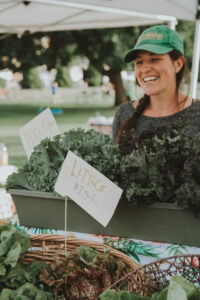 Business Impact NW Empowers Entrepreneurs
Business Impact NW Empowers Entrepreneurs
Business Impact NW is dedicated to supporting food and farm businesses from the start-up to expansion stages. With engaging workshops, free expert business coaching, financial education and assistance, all tailored to fit each individual business’ need, Business Impact NW equips entrepreneurs with the tools they need to succeed.
Business Impact NW offers the Food Business Resource Center (FBRC) to assist those launching or expanding within the food and farm industry. Devra Gartenstein, the FBRC’s King County Farm Business Support Specialist, has owned and operated small food businesses for over 30 years, including Patty Pan Grill, Seattle’s oldest farmers market concession, which specializes in creating value-added products from local agricultural ingredients. Devra provides the following insight for entrepreneurs interested in participating in their local farmers market:
The opportunity to vend at winter farmers’ markets can make the difference between running a business as a seasonal, part-time venture, and being able to earn a consistent, year-round income.
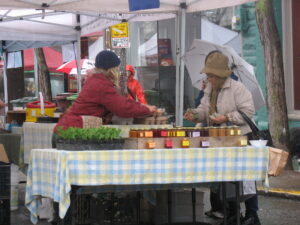 Thriving In Farmers Markets: Making Every Season Work For You
Thriving In Farmers Markets: Making Every Season Work For You
Seasonal farmers’ markets will start to wind down soon, but fortunately the Northwest is home to plenty of established winter markets that offer year-round vending opportunities. Some of these year round markets include: University District Neighborhood Farmers Market, West Seattle Neighborhood Farmers Market, and Capitol Hill Neighborhood Farmers Market. Naturally, the weather may be more problematic in winter, than during peak season, but winter markets are a great way to extend your selling season.
If you’re just getting started at farmers’ markets, winter markets provide great opportunities because there’s more space and it’s easier to land a spot. Once you build a track record selling at winter markets, it’ll be easier in the other seasonal markets.
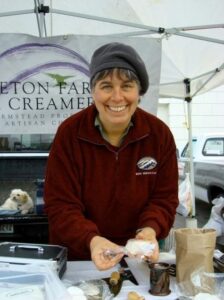 Small Business Tips For Selling At Winter Farmers Markets:
Small Business Tips For Selling At Winter Farmers Markets:
- Adjust your expectations. Anything can happen on any given day, and winter markets sometimes even shut down completely because of snow and windstorms. Think of success in terms of the viability of the entire season. Try not to be too discouraged if you sell less on a particular day.
- Be consistent. Attend as many markets as you can, even if the weather is lousy and you don’t expect to sell much. Winter markets—even more than summer markets—depend on consistency. Customers are more likely to venture into the elements if there are enough vendors to make it worth their while.
- Enjoy the community. There’s an especially strong sense of solidarity at winter markets, which rely on ongoing attendance from hardy vendors. You’re all in this together, which can feel good, even on challenging days.
- Take care of yourself. Dress warmly, dress in layers, and bring a mat so you don’t have to stand on cold ground. Take a long hot bath at the end of the day.
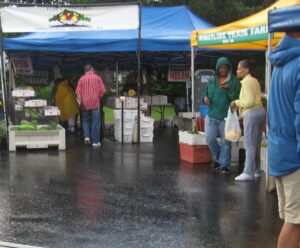 Whether you are determining how to price your products or just starting out, seasonal farmers markets offer a great opportunity to showcase your business. With winter markets more widely available in the Pacific Northwest due to the mild climate, businesses can make the traditional “off- season” profitable. The Food Business Resource Center supports food and farm businesses with creating business plans, learning or updating marketing skills, navigating regulations and licensure, free business coaching, and much more. Our dedicated team of coaches are here to support food and farm businesses at every step of their journey.
Whether you are determining how to price your products or just starting out, seasonal farmers markets offer a great opportunity to showcase your business. With winter markets more widely available in the Pacific Northwest due to the mild climate, businesses can make the traditional “off- season” profitable. The Food Business Resource Center supports food and farm businesses with creating business plans, learning or updating marketing skills, navigating regulations and licensure, free business coaching, and much more. Our dedicated team of coaches are here to support food and farm businesses at every step of their journey.
Interested in the programs the FBRC has to offer? Click here.
Would you like more information on how to market your business? Click here.
About the author

Devra Gartenstein
(Dev-ruh Gar-tin-steen)
Devra is the King County Farm Business Support Specialist for Business Impact NW, where she empowers food and farm business clients within King County, Washington. Devra supports entrepreneurs, teaches classes, and builds connections within the local food community through outreach and engagement. Devra has extensive experience with farmer’s markets and helps to empower entrepreneurs through her vast knowledge of market operations. With over 35 years of experience as a food business owner and operator, she innately understands the needs of food and farm small businesses. Holding a Bachelor’s and Master’s in Philosophy, Devra empowers small business owners with leadership and personal experience.

